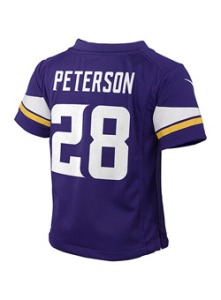One small jersey is perhaps the most shameless, most unethical, most ironic, most disappointing, most infuriating piece of sports marketing you have seen in a long time:
It’s a jersey for a toddler. Someone of an age when they’re picking their first favourite player, a hero selected for often arbitrary and irrelevant reasons, who should remain treasured as the child grows into adulthood. A player who should remind the beholder of a simpler, more innocent time in their life.
Of course, thanks to the actions of some athletes, the choices of some kids turn out to be less simple-naïve-adoration and more innocence-shattering-life-lesson.
In ‘One Week at a Time: Sex, Footy and the Flag” – an extract of which is one of the great pieces of Australian sports writing – Stephanie Holt provided a stunning example of this when describing her young daughter Lydia’s joy at presenting a jumper to a random player at the St.Kilda Family Day:
“Lydia, concentrating on doing everything right, takes the stage right on cue, hands over a jumper as Leigh Montagna is introduced…turns and heads off stage.
“‘He asked me if I’d like a kiss,’ says Lydia; when I pump her for details, afterwards, and though she’d been too nervous to answer, she is delighted by the brief, gallant brush on the cheek she received. ‘He’s really really nice,’ she tells me.
“We head off to buy a Leigh Montagna badge. Lydia’s beaming fit to burst.
“Less than two days later, we wake to the news that Stephen Milne and Leigh Montagna have been accused of sexual assault.”
Throughout sports history, when stars commit atrocious acts – be them related to betting, to drugs, or to far more heinous crimes – parents are thrust into the role of translating such adult material to children still young enough to be imbued with a belief in the inherent goodness of their heroes, if not all of mankind.
And yet, the first item on the ‘Toddlers 2-4’ page of the Minnesota Vikings online store is a toddler-sized Adrian Peterson jersey. In fact, three of the first five items are emblazoned with Peterson’s name and number, including a pink “Girls Vikings Adrian Peterson My Crush T-Shirt”.
Last September, Adrian Peterson was indicted in Texas on charges of reckless or negligent injury to a child. Peterson used a tree branch with the leaves removed – which he referred to as a ‘switch’ – to thrash his four year old son repeatedly on his back, backside, legs and scrotum. Apparently, the kid had pushed another of Peterson’s children off a motorbike video game. TMZ published photos of the kid’s injuries, which won’t be linked to here.
Peterson referred to the incident as a “whooping”. He pleaded no contest, avoiding jail through a plea deal.
After being suspended from the NFL for a season, Peterson was reinstated last week and is reportedly receiving interest from a number of NFL teams keen on obtaining his services from the Vikings.
Different sports in different cultures draw their ethical lines in different places. This past weekend, the tennis cognoscenti tut-tutted about Genie Bouchard’s arrogance and lack-of-sportsmanship when she refused to follow Fed Cup tradition and shake her opponent’s hand before the tie. Meanwhile, the NFL is famous for employing players who are suspected of murder or who have served time for severe, indescribable cruelty to animals.
And in 2015, no longer is it bad enough for a child’s hero to fall from grace. Now, the modern NFL is ahead of the game: they promote the idea of pre-schoolers worshiping a man who beats up pre-schoolers.

